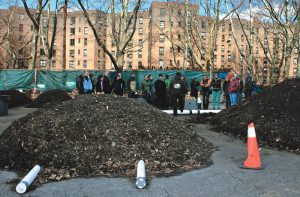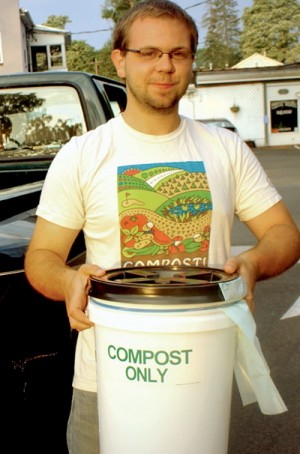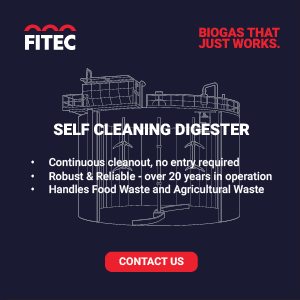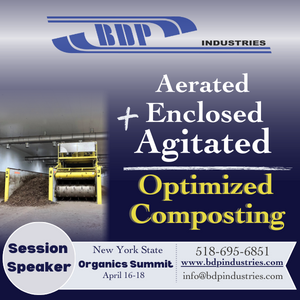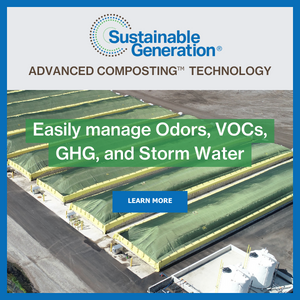BioCycle July 2013, Vol. 54, No. 7, p. 12
New York, New York: Community Composting Statistics
For the last several months, BioCycle has been collaborating with a network of community composting stakeholders in New York City to prepare a series of articles as well as to help lay the foundation for a National Forum on Community Composting. A Commentary in this issue by David Buckel, “Why Big And Small Organics Recyclers Need Each Other” (p. 62), explains the critical role that community composters play in managing source separated organics generated in New York City, as well as any other urban area. We asked Buckel and Robin Barton, a member of the Manhattan Solid Waste Advisory Board and a community composting advocate, if they had any statistics on diversion amounts and community participation in these composting programs. Here’s a summary:
Added Value at Red Hook Community Farm in Brooklyn: 225 tons of all organics diverted with a total of 2,206.50 volunteer hours in 2012; Lower East Side Ecology Center in Manhattan: About 200 tons of food waste from about 1,500 New York City households in 2012; BIG!Compost in Queens: About 97 tons of food waste processed with help of 887 volunteers, with total participation rate of 1,950 households, and 50 tons of compost and 16 tons of mulch distributed to over 65 greening initiatives, from street tree stewards to urban farms (June 2012-May 2013); Compost for Brooklyn: Composts an average of 18 tons/year of food waste in 2,000 square feet with help of 15 shift leaders and many one-time volunteers; The Old Stone House and Garden Of Union in Brooklyn: Old Stone House composts 4 tons/year in 96 sq. ft. and Garden of Union composts 14 tons/year in 308 sq. ft.
Orono, Maine: Food Waste Workshop
A Workshop on Food Waste Management: Compost & Anaerobic Digestion will be held on August 21-22, 2013, at the University of Maine in Orono, with an optional tour of three facilities managing food waste with different technologies on August 23. Presentations will cover: Components of food waste management; Compost methodologies and anaerobic digestion; Recipe development; Troubleshooting; Behind the scenes of successful food waste management. For more details, contact Mark Hutchinson of University of Maine Cooperative Extension, mhutch@maine.edu; phone: 207-832-0343.
Pebble Beach, California: High School Goes In-Vessel For Composting
Stevenson School, a private high school in Pebble Beach, installed an in-vessel composter in spring of 2012 for its pre and postconsumer food waste. After a trial run, some adjustments were made to produce higher-quality compost, according to Bob McCormick, an Environmental Science Teacher at the school. One change was eliminating many of the small plastic containers used in the cafeteria that made their way into the compost (jelly, peanut butter, butter, etc). Staff also was able to reduce odors and increase compost decomposition rates by “limiting how much we run the vent fan. So far, these modifications have resulted in better compost,” McCormick says. The school purchased a Rocket composter system for $50,000 (made by an English firm, Tidy Planet), which has a 14-day retention time in the unit. Since the fall of 2012, nearly all of the kitchen waste generated on the Pebble Beach Campus is being composted. About 30 gallons/day of compost are produced. Some is used for on-campus landscaping, and some is given to students’ families. About 350 gallons/week of wood chips are needed for amendment. Stevenson School has been getting free wood chips from a local company. School officials are looking for a local business to regularly pick up the compost and use it, McCormick adds.
Students are involved in the maintenance, kitchen staff is helping with collection and transport of the food waste, and faculty is engaged in making this an educational asset to the school, he notes. “We are now asking parents and friends of the school to get involved. The composting system will greatly reduce Stevenson’s energy and waste disposal footprint and also provide educational opportunities to implement innovative and hands-on science activities, which many faculty and students have already begun working on.” While it is difficult to determine how much money the school has saved through trash reduction, “it has been significant,” he adds.
Bethlehem, New York: Residential Food Waste Pilot
Empire Zero, a food waste hauling company in Castleton, New York, kicked off a residential pilot program in the Town of Bethlehem in late June. The new program gives customers two 5-gallon buckets for food scraps and compostables that are picked up weekly. Meat, dairy and bones, compostable paper and cardboard, and vegetable and fruit scraps are accepted. At the end of the month, households receive a bucket of compost. Cost of the service is $5/week. “I believe this is the first curbside residential food waste composting service in the state in a suburban community,” says Dan Rain, Town Recycling Coordinator. “Now those households who don’t have the time or space for backyard composting have a convenient curbside pick-up option.”
This is Empire Zero’s first residential program. The company was cofounded by Tyler Holloway, a college senior, to collect food scraps from several colleges in the Albany area, as well as hospitals, restaurants and other food waste generators. Collected organics are taken to the Schenectady County composting facility. “We don’t want to be defined as ‘just another hauling company,’” says Holloway. “We want to give folks the option of having a zero waste household or business.”
Iowa City, Iowa: Commercial Organics Composting
According to a 2011 waste characterization study done at the Iowa City Landfill and Recycling Center, about 25 percent of what goes into the landfill is organic. Food waste comprises about 15 percent of that, or about 18,000 tons/year. To address the situation, Iowa City has a commercial composting facility at its landfill for yard trimmings, food waste and other organics. The tip fee for commercial organics is $24/ton, which is less than the cost of landfilling the material, according to the Iowa City composting page on its website. No contamination is allowed or the load is treated and charged as trash. Materials must arrive unbagged, in paper bags or in preapproved biodegradable, compostable bags that meet ASTM D6400 certification. All food waste is accepted, along with food-soiled paper. A growing number of commercial and institutional generators in the Iowa City region are initiating source separation programs, including Hy-Vee grocery stores and restaurants.



